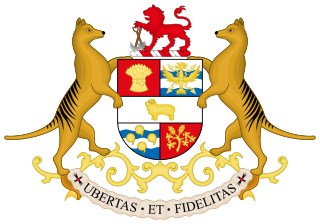
The premier of Tasmania is the head of the executive government in the Australian state of Tasmania. By convention, the leader of the party or political grouping which has majority support in the House of Assembly is invited by the governor of Tasmania to be premier and principal adviser.
The history of Tasmania begins at the end of the Last Glacial Period when it is believed that the island was joined to the Australian mainland. Little is known of the human history of the island until the British colonisation of Tasmania in the 19th century.

The House of Assembly, or Lower House, is one of the two chambers of the Parliament of Tasmania in Australia. The other is the Legislative Council or Upper House. It sits in Parliament House in the state capital, Hobart.
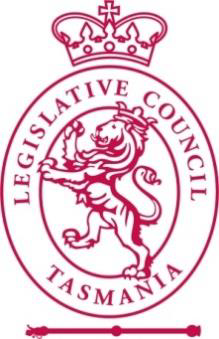
The Tasmanian Legislative Council is the upper house of the Parliament of Tasmania in Australia. It is one of the two chambers of the Parliament, the other being the House of Assembly. Both houses sit in Parliament House in the state capital, Hobart. Members of the Legislative Council are often referred to as MLCs.
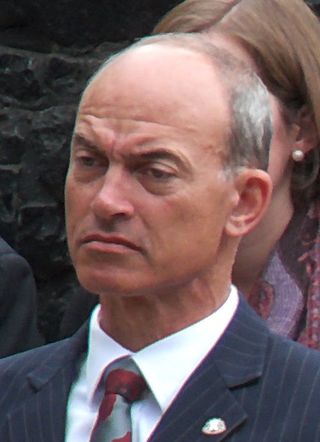
Guy Barnett is the Attorney-General for Tasmania and a Liberal Party member of the Tasmanian House of Assembly representing the Division of Lyons. Guy Barnett is currently the Minister for Justice and Health under Premier Jeremy Rockliff. Guy Barnett served previously as the Minister for Primary Industries and Water, Minister for Resources, Minister for Trade, Minister for Veterans' Affairs and Minister for Energy and Emissions Reduction in the Second Gutwein Ministry. He was previously a member of the Australian Senate.

George Town is a large town in north-east Tasmania, on the eastern bank of the mouth of the Tamar River. The Australian Bureau of Statistics records the George Town Municipal Area had a population of 6,764 as of 30 June 2016.

The Parliament of Tasmania is the bicameral legislature of the Australian state of Tasmania. It follows a Westminster-derived parliamentary system and consists of the governor of Tasmania, the Tasmanian House of Assembly, and Tasmanian Legislative Council. Since 1841, both Houses have met in Parliament House, Hobart. The Parliament of Tasmania first met in 1856.

The Queensland Government or the Government of Queensland is the executive branch of the Australian state of Queensland. The executive is chosen from the party or coalition that has gained a majority in the Queensland Legislative Assembly and has been appointed by the governor to form a government. They govern the parliamentary constitutional monarchy of the Australian state of Queensland through passing laws in the Legislative Assembly and through executive actions taken as ministers. The first government of Queensland was formed in 1859 when Queensland separated from New South Wales under a new Constitution, which has now been amended from time to time. Since the Federation of Australia in 1901, Queensland has been a state of Australia, with the Constitution of Australia regulating the relationships between all state and territory governments and the Australian Government. Under the Australian Constitution, all states ceded powers relating to certain matters to the federal government.
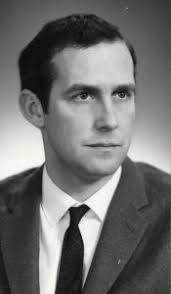
Douglas Ackley Lowe AM was the 35th Premier of Tasmania, from 1 December 1977 to 11 November 1981. His time as Premier coincided with controversy over a proposal to build a dam on Tasmania's Gordon River, which would have flooded parts of the Franklin River. The ensuing crisis saw Lowe overthrown as Premier and resign from the Labor Party, acting as an independent for the remainder of his political career.

William Edward Felix Hodgman is an Australian diplomat and former politician who has been the High Commissioner of Australia to Singapore since February 2021. He was the 45th Premier of Tasmania and a member for the Division of Franklin in the Tasmanian House of Assembly from the 2002 state election until his resignation in January 2020. He became premier following the 2014 state election, having been Leader of the Opposition since 2006. He was re-elected to a second term in government following victory in the 2018 state election.
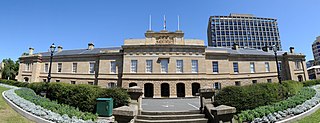
Parliament House, Hobart, located on Salamanca Place in Hobart, Tasmania, Australia, is the meeting place of the Parliament of Tasmania. The building was originally designed as a customs house but changed use in 1841 when Tasmania achieved self-government. The building served both purposes from 1841 to 1904, when the customs offices were relocated.
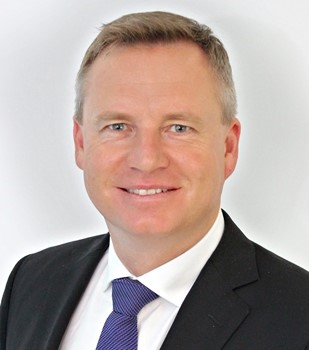
Jeremy Page Rockliff is an Australian politician and farmer, and the 47th and current premier of Tasmania since 2022. He has been the leader of the Tasmanian division of the Liberal Party of Australia since 2022 and a member of the Tasmanian House of Assembly for the division of Braddon since the 2002. He was previously the 20th deputy premier of Tasmania from 2014 to 2022. Since the electoral defeat of the Coalition government in New South Wales in March 2023, Rockliff is the only incumbent non-Labor leader of an Australian state government.

The Tasmanian Ports Corporation, also known as TasPorts, is the Tasmanian Government state owned corporation that has responsibility for the operation and management of all ports in Tasmania, Australia. TasPorts was created for the purpose of facilitating trade for the benefit of Tasmania, an island state, through the commercial provision of infrastructure and services.

Peter Carl Gutwein is an Australian politician who was the 46th premier of Tasmania from 2020 to 2022. He was a Liberal Party member of the Tasmanian House of Assembly from 2002 to 2022, representing the electorate of Bass. He succeeded Will Hodgman as leader of the Liberal Party and Tasmanian Premier on 20 January 2020.

The Constitution of Tasmania sets out the rules, customs and laws that provide for the structure of the Government of the Australian State of Tasmania. Like all state constitutions it consists of both unwritten and written elements which include:
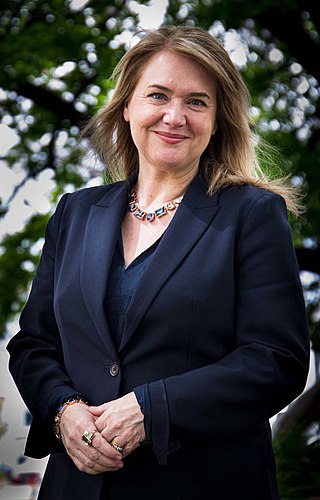
Madeleine Ruth Ogilvie is an Australian lawyer and politician. She is a Liberal Party member of the Tasmanian House of Assembly representing the Division of Clark and is the Minister for Small Business, Advanced Manufacturing and Defence Industries, Science and Technology, Racing and Heritage in the Rockliff ministry. She was previously the Minister for Hospitality, Racing, Small Business, Women and Disability Services in the Second Gutwein Ministry for six weeks.

The electoral division of McIntyre is one of the fifteen electorates in the Tasmanian Legislative Council, it includes Flinders Island, the northern east coast of Tasmania, and regional areas south and west of Launceston. It is named after Margaret McIntyre, who was the first woman to be elected into the Parliament of Tasmania in 1948.
Tasmania, as an advanced economy with a globally high standard of living, uses a great deal of energy. Distinctive features of energy use in Tasmania include the high fraction of hydroelectricity usage, the absence of coal-fired electrical generation, relatively light usage of natural gas, particularly for domestic use, and a wide use of domestic wood-burning stoves. Energy production through hydroelectricity has been politically contentious, and conflicts over Tasmanian hydroelectric projects were integral to the formation of Green parties in Australia and across the world.

The next Tasmanian state election is scheduled to be held on or before Saturday 28 June 2025 to elect all 35 members to the House of Assembly.
The Rockliff ministry is the current ministry of the Tasmanian Government, led by Jeremy Rockliff of the Tasmanian Liberals. It was formed on 8 April 2022, after Rockliff was elected unopposed as leader of the Liberal Party and sworn as the state's 47th Premier by Governor Barbara Baker. The ministry replaced the Second Gutwein ministry, after former Premier Peter Gutwein resigned from his position and quit politics.















